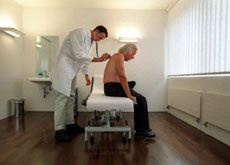Quality health care comes at a price

More and more Swiss are having difficulty paying their health insurance premiums.
According to a survey published on Thursday, three-quarters of those questioned want to see a “no-claims bonus” system introduced to ease the financial burden.
Over the past four years, the percentage of Swiss struggling to meet their monthly payments has continued to rise.
In a survey of 1,213 people, by the Bern-based GfS polling institute, more than one out of every two Swiss said spiralling costs were a problem.
But 51 per cent said they still wanted the right to choose their doctor, even if it added extra costs of the system.
The survey comes a week after health insurers called on the government to let them decide which doctors should be eligible to treat patients in an effort to save money.
Despite concerns over premiums, more than half of the respondents (53 per cent) said they wanted doctors to prescribe the best treatments and drugs available.
Only 12 percent favoured cutting treatments covered by basic health insurance.
Quality
“In spite of the fact that people are having trouble with premiums, they still want comprehensive coverage and the right to choose their doctor,” said Dominique Sprumont, vice-director of the Institute of Health Law at the University of Neuchâtel.
A majority of those questioned also favoured a system where premiums were set by a person’s ability to pay.
“You can see that they want: a premium that is based on income, like in every other country in Europe,” Sprumont told swissinfo.
“But the majority is weak, with only 27 per cent strongly in favour, and a large number hesitant, either mildly in favour or against.”
The survey was commissioned by Interpharma, which represents the interests of the Swiss pharmaceutical industry.
According to the Swiss Health Observatory, total costs for basic compulsory health insurance rose from SFr14.6 billion ($11.6 billion) to SFr18.2 billion in the five-year period ending in 2003.
The total cost of Switzerland’s health system was SFr48 billion in 2002 for a population of 7.5 million.
Income
When asked what they thought was behind rising premiums, respondents blamed an ageing population and overuse of medical services.
But they also pointed the finger at drug companies and health insurers for hitting consumers too hard in the pocket.
Responding to the findings, Nicole Bulliard, spokeswoman for Santésuisse, the association of Swiss health insurers, said help was available from the government.
“Thirty to forty per cent of policyholders are getting assistance, the burden for which is shared equally between the federal government and the cantons,” she told swissinfo.
“The cantons will assist with part or all of the burden,” she added.
But she acknowledged that financial aid fell short in some cases. Santésuisse is supporting a federal amendment to provide assistance for people whose premiums account for more than 12 per cent of their income.
Sprumont said such a system would not cut costs.
“A system limiting the premium to 12 per cent of income has heavy administrative costs, as you need more people to check the income claims,” he said.
“Indeed, how would income be calculated?”
swissinfo, Elizabeth Meen
The cost of basic health care rose by 24 per cent between 1999 and 2003.
Average monthly premiums rose from SFr166 in 1997 to SFr269 in 2003.
The government budgets SFr2.3 billion a year for subsidies for health insurance premiums; the cantons are expected to contribute around half that sum.
Of the 1,213 polled by the GFS Institute, 52% said they had trouble paying their premiums – up from 44% in 2003.
Fewer than 12 % would accept reduced coverage of treatments, and 51% of those questioned want the right to choose any physician or specialist.
They also want access to new drugs but would accept constraints on drugs for minor problems.

In compliance with the JTI standards
More: SWI swissinfo.ch certified by the Journalism Trust Initiative











You can find an overview of ongoing debates with our journalists here . Please join us!
If you want to start a conversation about a topic raised in this article or want to report factual errors, email us at english@swissinfo.ch.